Airlines, Airports and Airliners News -19 to 26 April 2020
Compiled by Willie Bodenstein

ETHIOPIAN CARGO DEPLOYS ITS ADVANCED PHARMA WING IN THE GLOBAL FIGHT AGAINST THE COVID-19

In response to the growing demand for air cargo services following the spread of COVID- 19, Ethiopian has been deploying its massive cargo capacity to facilitate the flow of essential cargo such as medical supplies wherever they are needed.
The state-of-the-art Pharma Wing of Ethiopian Cargo & Logistics Services, which is housed within the largest trans-shipment terminal in Africa, has been central to the airline's effective handling and shipping of medical supplies across Africa and beyond.
Equipped with temperature-controlled pharma handling storage covering an area of 54,000 sq. m, the Pharma Wing is suitable for handling medical supplies in different temperature ranges through the use of active containers and real-time temperature monitoring system. Dedicated and trained staff stationed at the facility ensure that all operations are carried out in line with the rules and regulations of IATA and other regulatory bodies throughout the supply chain.
Commenting on the critical role of Ethiopian Cargo & Logistics Services and its facilities amidst the pandemic, Ethiopian Group CEO Tewolde GebreMariam remarked, "Ethiopian Airlines has been a key enabler in the global effort to conquer COVID-19 by facilitating the shipment of life-saving medical supplies to different parts of the world. We feel privileged to serve the world in this difficult time deploying our state-of-the-art Pharma Wing as well as our cargo and passenger fleet. Now that Addis Ababa is designated as a Humanitarian Air Hub by WFP and WHO owing to our advanced facilities, vast network of 127 international destinations and fleet, we will further bolster our efforts as the leading air cargo service provider in Africa."
Currently, Ethiopian Cargo & Logistics Services is transporting an average 1.4 million kg of temperature-sensitive healthcare products monthly including medicines, biologicals, bio-technologies, diagnostics, vaccines and medical devices among others.
It is to be recalled that different UN Agencies, donor governments and philanthropists are using Addis Ababa as a hub to distribute medical supplies across Africa as part of the global effort to contain COVID-19.
EASA CERTIFIES A330-800 FOR "BEYOND 180 MINUTES" ETOPS
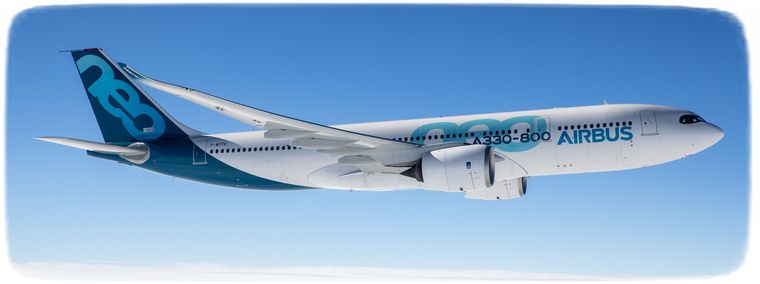
The European Union Aviation Safety Agency (EASA) has approved the A330-800 for ETOPS (Extended-range Twin-engine Operations) "beyond 180 minutes" diversion time. This achievement means that operators of this A330neo variant will benefit from the most efficient, reliable and direct long-range routings. In particular, it will maximise the A330-800's exceptional transpacific range capability of up to 8,150nm.
The latest approval for the -800, which includes ETOPS 180 minutes capability in the aircraft's basic specification, also includes the option for "ETOPS 285 minutes". This extends the potential air diversion distance to around 2,000nm. The US FAA's respective ETOPS certification for the A330-800 is expected soon. The similar ETOPS approval for the larger A330-900 took place in January 2019.
The A330-800, which in February 2020 received its joint Type Certification from EASA and the FAA, like the larger A330-900 model incorporates highly efficient Rolls-Royce Trent 7000 engines, a new 3D-optimised wing with greater span and lighter composite materials, plus new wingtip Sharklets.
RUNWAY WORKS UNDERWAY AT LONDON STANSTED AS TRUCKS REPLACE TAKE-OFFS
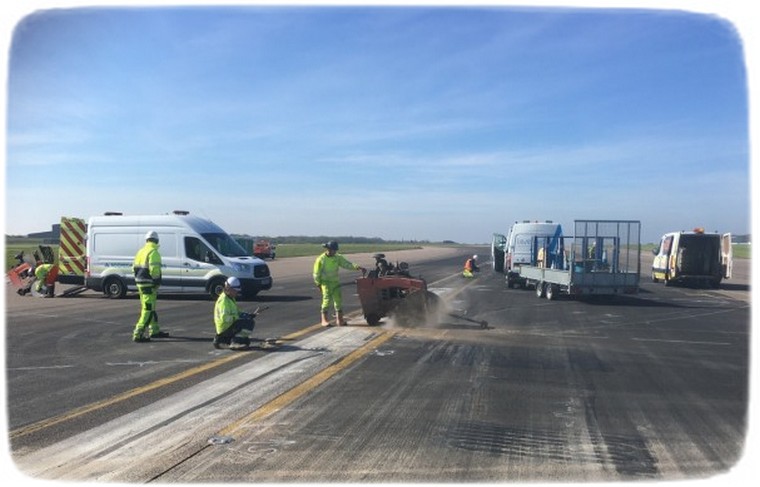
London Stansted's engineering team is using the unprecedented grounding of aircraft across the globe as a unique opportunity to move planned overnight runway maintenance works to daytime hours. The runway works are taking place on weekdays between 14 April to 24 April.
Stansted's 3,048 metre runway undergoes full re-surfacing work every 10 to 15 years but, as with other busy airports, regular heavy maintenance also takes place twice a year, overnight at weekends in the spring and autumn to minimise disruption to flights.
While the airport remains open for business with a limited number of commercial flights still operating, as well as a busy cargo operation that continues to bring vital supplies into the UK, the current reduction in flights has enabled the engineering and airfield operational teams to close the runway during part of the day. This change creates an extended period of time for specialist contractors to safely access the runway and makes it easier to carry out technical work in daylight hours rather than at night.
The project is being managed by Stansted's Engineering Maintenance team and delivered by Marriott Civils, with up to 200 contractors and engineers plus 100 vehicles and items of machinery tasked with laying the 1,000 tonnes of asphalt necessary to complete the work.
At the same time, 3,600 airfield lights are being upgraded with energy efficient, high performance LED lamps, similar to those already installed on the runway, that are crucial in the safe operation of aircraft in low visibility conditions. The new low energy LED variants will reduce power output from airfield lights by around 70%, helping drive down operating costs and cutting emissions.
EMIRATES STEPS UP SAFETY MEASURES FOR CUSTOMERS AND EMPLOYEES AT THE AIRPORT AND ON BOARD
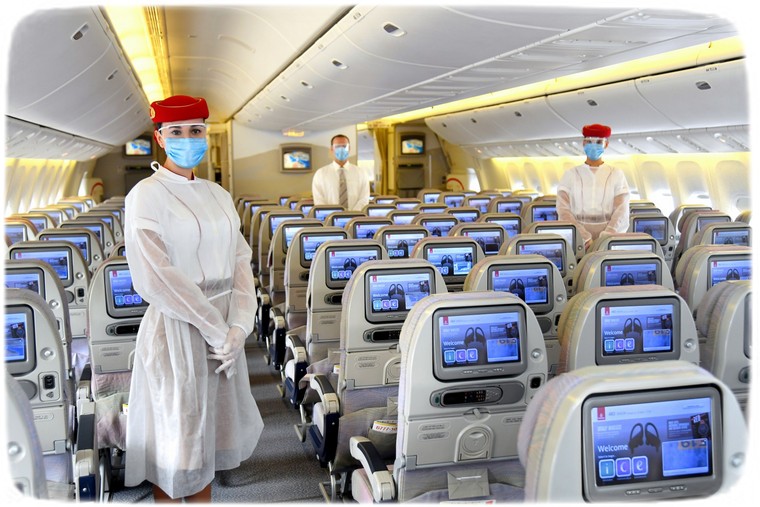
Emirates is stepping up precautionary measures at the airport and on board to ensure the health and safety of its employees and customers. All cabin crew, boarding agents and ground staff in direct contact with passengers will now don personal protective equipment (PPE) which includes a protective disposable gown over their uniforms and a safety visor, in addition to masks and gloves.
At Dubai International airport, gloves and masks are mandatory for all customers and employees. Thermal scanners monitor the temperatures of all passengers and employees stepping into the airport. Physical distancing indicators have been placed on the ground and at waiting areas to help travellers maintain the necessary distance during check-in and boarding.
The airport team has also installed protective barriers at each check-in desk to provide additional safety reassurance to passengers and employees during interaction over the counter.
On board Emirates' flights, seats are pre-allocated with vacant seats placed between individual passengers or family groups in observance of physical distancing protocols.
Emirates has also modified its inflight services for health and safety reasons. Food and beverages continue to be offered in the form of bento-styled boxes to reduce contact between the crew and customers during meal service and to minimise risk of interaction. The personal boxes provide customers with sandwiches, beverages, snacks and desserts.
Similarly, to reduce risk of spreading the virus by touch, magazines and other print reading material are temporarily unavailable. Cabin baggage are currently not accepted on flights. Carry-on items allowed in the cabin are limited to laptops, handbags, briefcases or baby items. All other items have to be checked in, and Emirates will add the cabin baggage allowance to customers' check-in baggage allowance. Customers have to wear their masks and gloves throughout their journey from check-in until they disembark.
All Emirates aircraft will go through enhanced cleaning and disinfection processes in Dubai, after each journey
HONG KONG INTERNATIONAL AIRPORT-COVID-19 PANDEMIC CONTINUES TO SERIOUSLY IMPACT AIR TRAFFIC IN MARCH
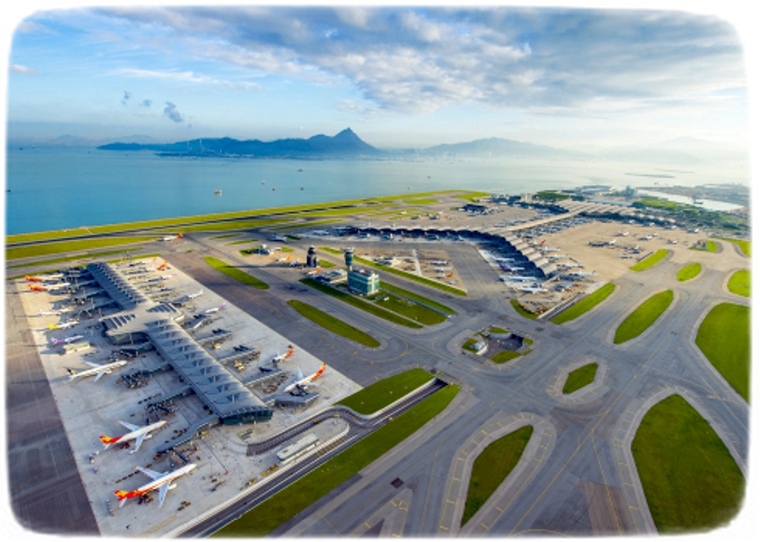
Airport Authority Hong Kong (AA) announced that Hong Kong International Airport (HKIA) handled 576,000 passengers and 12,115 flight movements in March 2020, representing year-on-year decreases of 91.0% and 67.0%, respectively. Cargo throughput dropped 12.4% to 378,000 tonnes compared to the same month last year.
As countries and regions worldwide continued to impose immigration restrictions and implement quarantine measures, a sharp decline of passenger traffic was recorded in March. Locally, starting from 25 March, all transit and transfer services at HKIA have been suspended and all non-Hong Kong residents coming from overseas countries and regions by plane are denied entry to Hong Kong. All these factors led to a very weak travel demand in March and airlines have suspended more flights. Visitor traffic, which was impacted the most, experienced 97% year-on-year decrease. Transfer/ transit traffic and Hong Kong resident travel also declined by 91% and 83%, respectively.
On the cargo front, amongst the key trading regions, traffic to and from Southeast Asia and Europe decreased most significantly in March. The decline in cargo throughput was mainly attributed to 42% decrease in transhipments. Exports was stable while imports grew slightly by 1% year-on-year.
To support business partners and airport staff, the AA has introduced an array of relief measures since the COVID-19 outbreak, including rental concessions, reduction or waiver of fees, and a staff training allowance scheme, among others. The latest round of AA's relief measures was announced on 8 April, worth up to HK$2 billion, providing further support to airlines and aviation support services operators through helping to ease their liquidity pressure."
Over the first quarter the year, HKIA handled 8.2 million passengers and 63,345 flight movements, representing year-on-year decreases of 56.5% and 40.1%, respectively. Cargo throughput fell 10.9% to 988,000 tonnes compared to the same period last year.
On a 12-month rolling basis, passenger volume and flight movements respectively dropped 18.9% and 12.0% to 60.9 million and 377,420. Cargo throughput decreased by 7.3% to 4.7 million tonnes.
BOEING ACTIVATES AIRLIFT CAPABILITIES FOR FIRST COVID-19 TRANSPORT MISSION
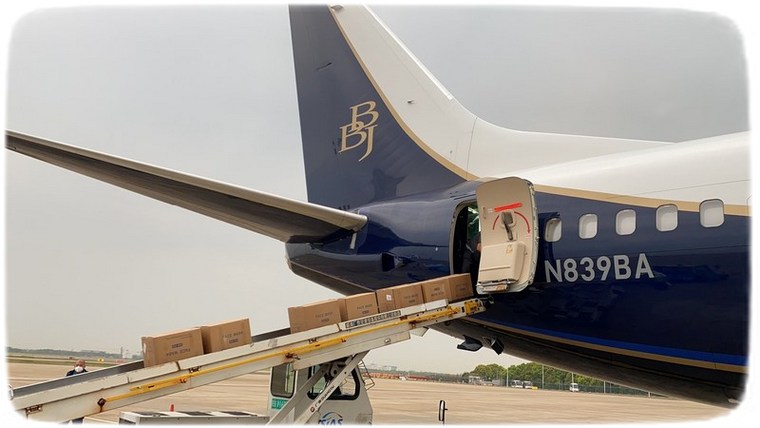
Boeing [NYSE: BA] completed its first COVID-19 transport mission, using a 737-700 aircraft from its corporate fleet to bring personal protective equipment (PPE) from China to the United States. Working in partnership with FIRST® Robotics Founder Dean Kamen, the company transported 540,000 medical-grade face masks that will be delivered to healthcare professionals battling COVID-19 in New Hampshire.
Kamen, who has a longstanding relationship with Boeing through FIRST Robotics, is also a founder of DEKA Research and Development Corporation. He worked with DEKA to secure the face masks from manufacturers in China and turned to Boeing to facilitate their transport. DEKA is the importer of record for the delivery and provided the masks to New Hampshire for distribution to healthcare professionals in the state.
Boeing continues to support local communities and the heroic healthcare professionals working tirelessly to stop the spread of COVID-19. Additional airlift transport missions with the Boeing Dreamlifter and ecoDemonstrator are planned in the future. Boeing is coordinating closely with U.S. government officials on how to best assist areas with the greatest need.
A321XLR PROGRAMME DEVELOPMENT AND INDUSTRIALISATION GATHERS PACE
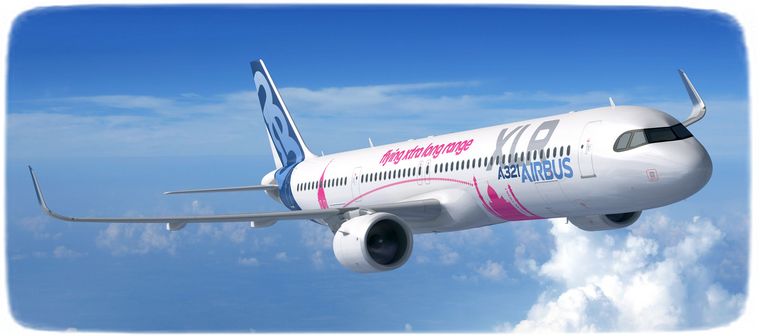
Following its launch at the Paris Air Show last year, the industrialisation of the A321XLR long range single-aisle programme is underway and the aircraft's design is moving from concept to reality. By early 2020, the first long-lead components for the initial A321XLR flight-test aircraft were already in production - including the main landing gear forgings by Safran and the first parts for the centre wingbox by Airbus in Nantes.
Most recently, in March, Airbus completed its supplier selection for the new major components and systems which are specifically being designed for the A321XLR variant. These suppliers include: Spirit AeroSystems (inboard single-slotted flap); Diehl Aviation (potable water & water waste systems); FACC (modified belly fairing); Premium Aerotec (rear-centre fuel tank primary structure); Collins Aerospace (fuel system); Parker Aerospace (fuel tank inerting system); Vincorion (heated floor panels); Safran (main and nose landing gear); and Triumph Group (landing gear uplock mechanism).
In anticipation of the industrialisation phase, where relevant, the programme is applying Airbus' new "digital design, manufacturing and services" (DDMS) product lifecycle approach. This enables accurate virtual factory simulations to validate investments and ramp-up planning. A key pillar of the DDMS framework is the 3D "Digital Mock-up Unit" (DMU) database, which will allow concurrent design, assembly simulations and real-time 3D visibility across the transnational co-design plateaus at Toulouse, Hamburg and Filton. Furthermore, the A321XLR programme brings the benefits of 3D visualisation to the non-engineering community, including programme managers - who can now work in 3D thanks to 3D viewer tools.
In addition to the aforementioned digital environments, the installation of complementary physical demonstrators is also well underway for 'validation and verification' (V&V) of the various new structures and equipment of the A321XLR. For example, the Structures Demonstrator programme includes 'major component assembly' (MCA) join-up of fuselage sections 15 & 17, fuselage integration of the new rear-centre-[fuel]-tank, plus other modules and detailed parts. In parallel, the Equipment Demonstrator programme features physical trial installation in a full-size wooden mock-up by a multi-functional team representing each installed system, with experts from Engineering, Manufacturing Engineering, Production, Maintenance and Ergonomics. This approach minimises design clashes, as well as optimising ergonomics. Testing of the cabin comfort for long-range operations has already started, including the use of a climatic test chamber on ground.
To date, 24 customers have ordered a total of more than 450 A321XLRs, validating the market need for the unique capabilities offered by this aircraft. Flight-testing is due to start in 2022, and service entry from 2023. The A321XLR will provide airlines with a range of up to 4,700nm and a 30% lower fuel burn per seat compared with previous-generation competitor aircraft.
"WE WON'T LET WA DOWN" - PERTH AIRPORT
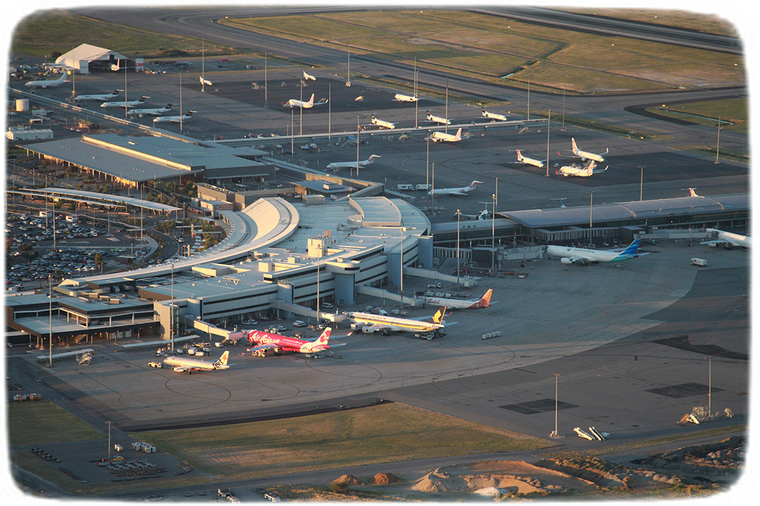
Perth Airport CEO Kevin Brown says it is vital that the airport remains operating to support the resources sector, despite the almost complete collapse of international and interstate passenger numbers.
Apart from servicing the FIFO workforce, Perth Airport also plays a critical role in the movement of freight both into and out of Western Australia, including vital medical supplies to support and protect our doctors and nurses on the coronavirus front-line.
Mr Brown has revealed that Perth Airport has taken a massive financial hit due to the coronavirus with an expected loss of up to $100 million in revenue in this financial year alone.
Passenger numbers confirm the extent of the revenue collapse faced by Perth Airport:
• In 2019, from April to September, more than 5 million interstate and international travellers moved through Perth Airport.
• With Federal and State coronavirus travel restrictions in place, that number is expected to be close to zero for the same period this year.
• FIFO flights normally account for around 20-25 per cent of Perth Airport passengers. For the foreseeable future, FIFO workers will be almost 100 per cent of passenger numbers.
"The coronavirus has been catastrophic for the aviation and tourism sectors and airports have not been immune from this," Mr Brown said.
Mr Brown said Perth Airport had already taken a number of steps to preserve jobs and keep the airport operational including:
• Advising shareholders (primarily Australian superannuation funds) there will be no dividend this year
• Working with the Perth Airport team to agree reduced working hours and the use of leave entitlements
• All members of the Executive taking a pay cut
• Cancellation of bonus payments for Executive and non-enterprise agreement staff
• Freezing all new recruitment
• Cutting all non-essential spending
• Placing the majority of the airport's capital works program on hold.
"We are also looking for additional operational savings, but we have been hindered by the fact we have five terminals stretched out over our 2000-hectare estate," Mr Brown said. "I'm proud of what they are doing to keep our airport operational and I'm committed to doing everything possible to preserve their jobs.
BOEING TO RESUME COMMERCIAL AIRPLANES PRODUCTION IN PUGET SOUND
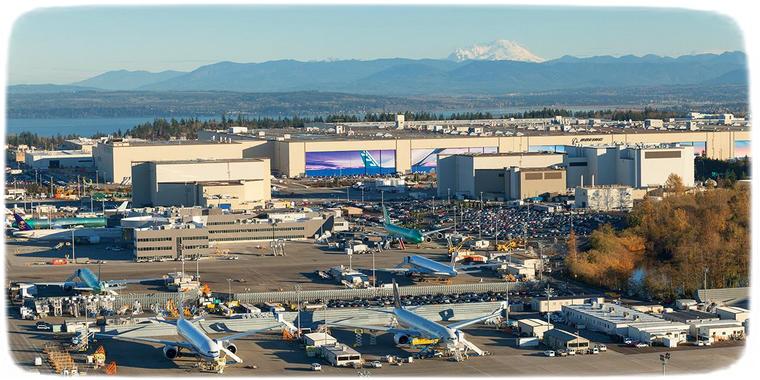
Boeing [NYSE: BA] will resume all Commercial Airplanes production in a phased approach at its Puget Sound-region facilities next week, after suspending operations last month in response to the COVID-19 pandemic. At all of its sites, the company has taken extra precautions and instituted comprehensive procedures to keep people safe and fight the spread of COVID-19.
Approximately 27,000 people in the Puget Sound area will return to production of the 747, 767, 777 and 787 programs, supporting critical global transportation infrastructure, cargo services and national defence and security missions. The 737 program will resume working toward restarting production of the 737 MAX. Boeing South Carolina remains in a suspension of operations at this time. Earlier this week Boeing restarted mostly defence production operations in the region with approximately 2,500 people.
Employees in the Puget Sound for the 737, 747, 767 and 777 will return as early as third shift on April 20 with most returning to work by April 21. Employees for the 787 program will return as early as third shift April 23, with most returning to work by April 24.
The company's practices reinforce enhanced cleaning, employee health and physical distancing in partnership with employees. Aligned with federal and state guidance, these practices include:
Staggered shift start times to reduce the flow of employees arriving and departing work, visual controls such as floor markings and signage to create physical distance, face coverings will be a requirement for employees at Boeing sites in Washington. Employees are strongly encouraged to bring in their own procedural mask or face covering; those who do not have a mask available will be provided with one. Providing required personal protective equipment to employees working in areas where physical distancing cannot be maintained for an extended period and asking employees to perform self-health checks before coming to work and to stay home if they are ill.
Enhanced measures will continue until conditions allow for a return to regular work and cleaning processes. Boeing will continue to monitor government guidance on COVID-19, assess impact on company operations and adjust plans as the situation evolves.
BARCELONA AIRPORT PASSENGER NUMBERS FOR MARCH DOWN 64.3% ON LAST YEAR

Passenger numbers at Barcelona's El Prat airport for March fell 64.3% compared to the same month last year, due to the coronavirus crisis.
A total of 1,417,647 people passed through the airport last month, with the number of flights reduced by almost half, to 13,846 (a 46.7% decrease).
During the first week of March, the impact of the pandemic had already caused a 20% drop in passengers. Flights from Italy were banned from March 11, and the state of alarm announced across Spain on March 14 saw more measures implemented, with airlines cancelling flights and reducing operations by 50%.
EMIRATES BECOMES FIRST AIRLINE TO CONDUCT ON-SITE RAPID COVID-19 TESTS FOR PASSENGERS

Emirates in coordination with Dubai Health Authority (DHA) will be introducing additional precautions. Passengers on flights to Tunisia were all tested for COVID-19 before departing from Dubai. Emirates is the first airline to conduct on-site rapid COVID-19 tests for passengers.
The quick blood test was conducted by the Dubai Health Authority (DHA) and results were available within 10 minutes. This test was conveniently done at the Group Check-in area of Dubai International Airport Terminal 3.
The airline's check-in and boarding formalities have also been adapted with social distancing in mind. Protective barriers have been installed at each check-in desk to provide additional safety measures to our passengers and employees during any interaction. Gloves, masks and hand sanitisers have been made mandatory for all employees at the airport.
Passengers are also required to wear their own masks when at the airport and on board the aircraft, and follow social distancing guidelines. Emirates has modified its inflight services for health and safety reasons.
Magazines and other print reading material will not be available and while food and beverages will continue to be offered on board, packaging and presentation will be modified to reduce contact during meal service and minimize risk of interaction. Cabin baggage are currently not accepted on flights. Carry-on items allowed in the cabin are limited to laptops, handbags, briefcases or baby items. All other items have to be checked in, and Emirates will add the cabin baggage allowance to customers' check-in baggage allowance.
All Emirates aircraft will go through enhanced cleaning and disinfection processes in Dubai, after each journey.
CATHAY PACIFIC GROUP RELEASES COMBINED TRAFFIC FIGURES FOR MARCH 2020

The Cathay Pacific Group released combined Cathay Pacific and Cathay Dragon traffic figures for March 2020 that show drastic decreases in the number of passengers carried and the amount of cargo and mail uplifted compared to the same month in 2019. The trend reflected the capacity reductions for March 2020 as the global COVID-19 pandemic continued to intensify with more and tightened travel restrictions and quarantine requirements implemented in Hong Kong and other markets.
Cathay Pacific and Cathay Dragon carried a total of 311,128 passengers last month, a decrease of 90% compared to March 2019. The month's revenue passenger kilometres (RPKs) also fell 84.3% year-on-year. Passenger load factor slid by 34.6 percentage points to 49.3%, while capacity, measured in available seat kilometres (ASKs), decreased by 73.2%.
The two airlines carried 119,277 tonnes of cargo and mail last month, a decrease of 35.6% compared to March 2019. The month's revenue freight tonne kilometres (RFTKs) also fell 29% year-on-year. The cargo and mail load factor increased by 9 percentage points to 77.4%, while capacity, measured in available freight tonne kilometres (AFTKs), was down by 37.2%.
Cathay Pacific Group Chief Customer and Commercial Officer Ronald Lam said: "Passenger demand dropped rapidly and tremendously in late March following the introduction of arrival restrictions on all non-resident visitors to Hong Kong, including transit passengers. On each of the last two days of March we carried fewer than 1,000 passengers only.
"While we continue to operate a full freighter schedule, our passenger flight reductions have had a significant impact on our overall cargo capacity. Our cargo volumes were down, but load factors and yield were up due to air cargo capacity reduction in the global market.
"To support global supply chains at this critical time, we have been adding cargo capacity in the form of more freighter flights as well as a total of 257 pairs of cargo-only passenger flights in March. We currently expect to operate a similar number of cargo-only passenger flights in April, including on some long-haul routes such as the Southwest Pacific where air cargo capacity is extremely tight.
"The resumption of production in mainland China saw exports from our home market Hong Kong and the mainland rebound following a weaker February. However, other transhipments were negatively impacted by lockdowns and emergency measures in various markets in the second half of the month, in particular the India sub-continent.
"Our commodity mix also changed with a surge in the transportation of medical supplies such as face masks, protective clothing, hand sanitiser and other pharmaceutical products. On the other hand, the volume of consumer goods such as garments and automobile parts declined.
AIR BRIDGE KLM AND MINISTRY OF HEALTH, WELFARE AND SPORT (VWS) WILL ENSURE A CONTINUOUS FLOW OF MEDICAL SUPPLIES FROM CHINA
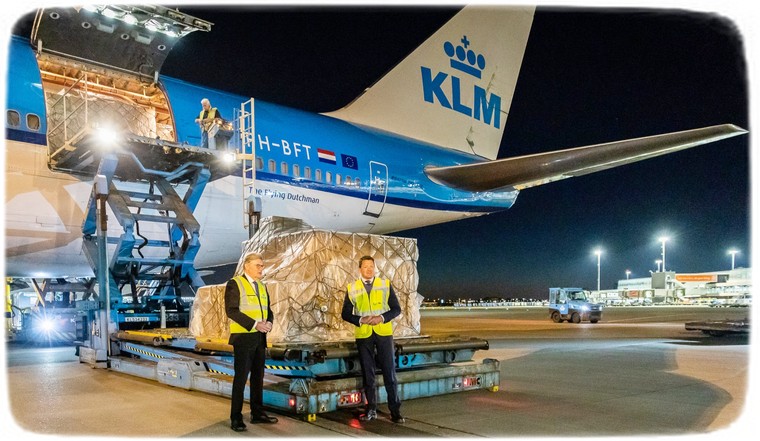
The first KLM Boeing 747 with medical supplies from Shanghai landed at Schiphol Airport. By expanding the air bridge between the Netherlands and China, the Netherlands is assured of a continuous flow of relief supplies.
KLM has especially brought the Boeing 747 combi back into operation for this important cargo airlift for the next 6 to 8 weeks. The almost daily flights ensure a continuous flow of medical supplies from China to the Netherlands.
So far, KLM and the Ministry of Health, Welfare and Sport have already brought 12 million mouth masks, hundreds of thousands of gloves, safety goggles, insulation jackets and hundreds of infusion pumps to the Netherlands.
The Boeing 747 with flight number KL894 from Shanghai, was filled to capacity with, among other things, hundreds of thousands of mouth masks, 30,000 insulation jackets and 30,000 safety goggles. Tomorrow and Wednesday, two more KLM-Boeings will land with medical goods from China, as part of the air bridge. Over the next 5 days, millions of mouth masks are expected.
"It's fantastic that the air bridge between China and the Netherlands will bring in a continuous stream of protective equipment. Over the next five days, millions of mouth masks will come in. They are desperately needed at the moment for all those people who are involved in care." Minister Martin van Rijn (VWS)
AIR NEW ZEALAND TRANSPORTS ESSENTIAL EXPERTISE FOR CRITICAL WELLINGTON WATER PROJECT
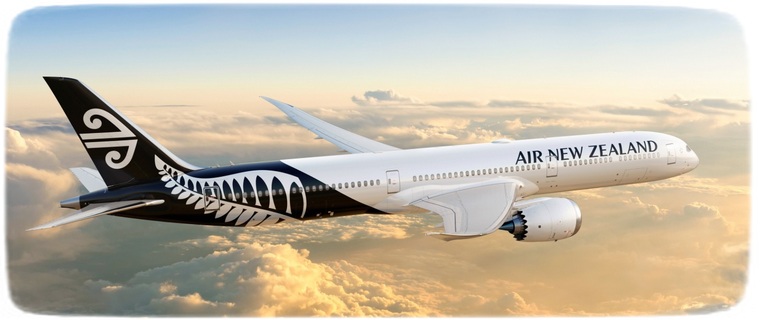
An Air New Zealand charter flight returned from Frankfurt to Auckland via Vancouver carrying five specialist engineers who will assist Wellington Water with urgent repair work on two of Wellington's wastewater pipelines.
Wellington Water approached Air New Zealand for its support in transporting essential personnel to the country for this critical repair. Flight NZ6011 is the return leg of one of a series of flights chartered by the German Government to repatriate German citizens from New Zealand.
Air New Zealand Chief Operational Integrity & Standards Officer Captain David Morgan says the airline is pleased to be able to work with Wellington Water with support from the Ministry of Foreign Affairs and Trade to transport essential expertise into the country under the extraordinary circumstances presented by the global pandemic.
AIRASIA UTILIZES AIRCRAFT TO MOVE CARGO FOR COVID-19 OPERATIONS
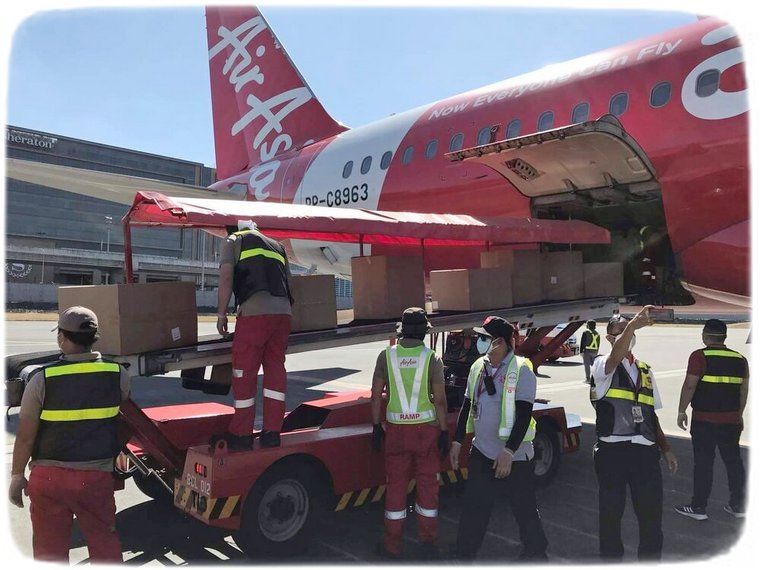
AirAsia has mounted at least six chartered cargo flights to Manila in support of emergency response initiatives in the country. Transported goods include over 600 boxes of Personal Protective Equipment amounting to over 3,000 kilograms from Shenzhen, China. Essential food items, such as tropical fish, were also brought to Manila amounting to nearly 5,000 kilograms from Bali, Indonesia.
AirAsia has directed its resources to transporting cargo in view of travel restrictions following the enhanced community quarantine in Luzon, including other parts of the country.
AirAsia Philippines CEO Ricky Isla said, "Air cargo is vital in the fight against COVID-19. We have been coordinating with our partners to ensure essential equipment and supplies reach their destinations, especially in areas that need it the most. These equipment and supplies are increasingly becoming critical as the demand for these surges.
More special cargo flights are being arranged as required in coordination with various private and public organizations.
NEW AIRCRAFT "E-DELIVERY" PROCESS ASSURES HEALTH & SAFETY FOR CUSTOMERS AND AIRBUS EMPLOYEES, AND ENABLES BUSINESS CONTINUITY
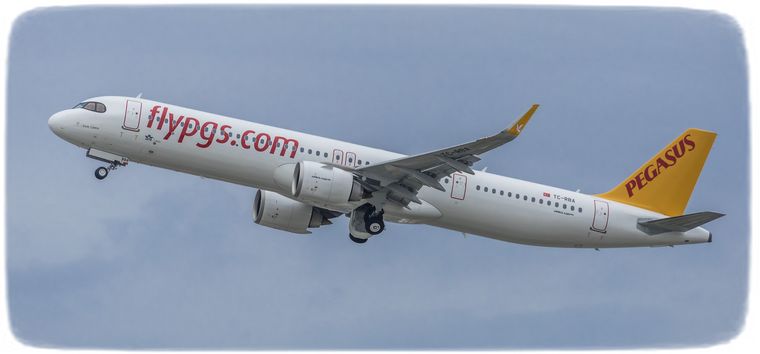
A new aircraft hand-over and "e-Delivery" virtual process has recently commenced operation, guaranteeing continuation of Airbus' delivery stream, while integrating the required health & safety requirements during the ongoing COVID-19 pandemic. The first customer to adopt the remote end-to-end process is Pegasus Airlines, which in the last few days received three brand new 'e-delivered' A320neo Family aircraft. More airlines will follow likewise in the coming days and weeks. This new e-Delivery approach comprises three main stages: (a) Technical Acceptance Completion (TAC) tasks delegated to Airbus (or to a local third party appointed by the airline); (b) electronic Transfer-of-Title (electronic ToT); and (c) ferry-flight and subsequent reception of the aircraft at the customer's base.
For the TAC (which is a prerequisite for ToT) the airline can delegate Airbus to perform, on its behalf, all the necessary actions. These include the 'ground-check', the acceptance test flight, acceptance manuals and procedures, as well as minor cosmetic rework if needed. Then for the ToT completion, Airbus' and customers' teams take benefit from a new secure collaborative platform: "e-SalesContracts". This brings them all together - wherever they happen to be - into one real-time virtual environment where they can optimise and simplify all the contractual transactions, from the paperless drafting and commercially negotiating the delivery documents up to the remote ToT digital signature. This platform thus obviates the need for any of the customer's own staff to be physically present at the Airbus Delivery Centre. After the TAC and ToT formalities are complete, the subsequent ferry-flight is also performed in a health-wise safe manner whereby the customer's own flight crew (or an appointed third party) can pick-up the sanitised aircraft and fly it straight back from the delivery centre to the airline's home base.
As well as affording a means of safe business continuity during the current COVID-19 crisis, the e-Delivery process, especially its new collaborative digital aspects - which confer enhanced workflow efficiencies, flexibility, transparency, plus a more environmentally-friendly and smoother overall customer experience - could become the blueprint for Airbus and its customers going forward.
|
                       |























